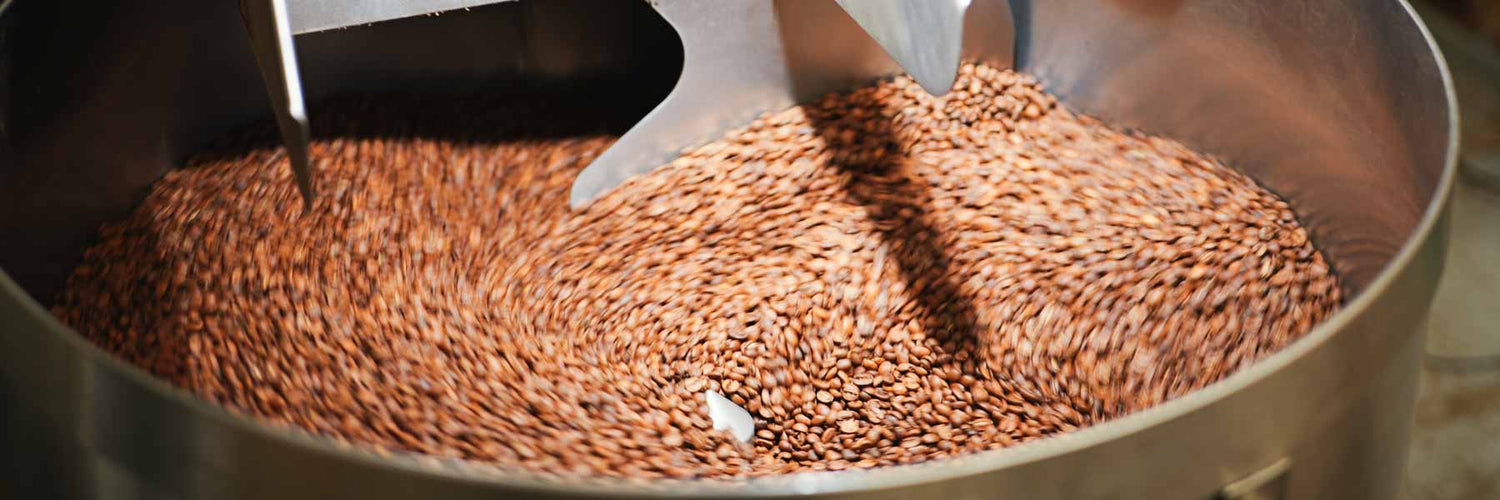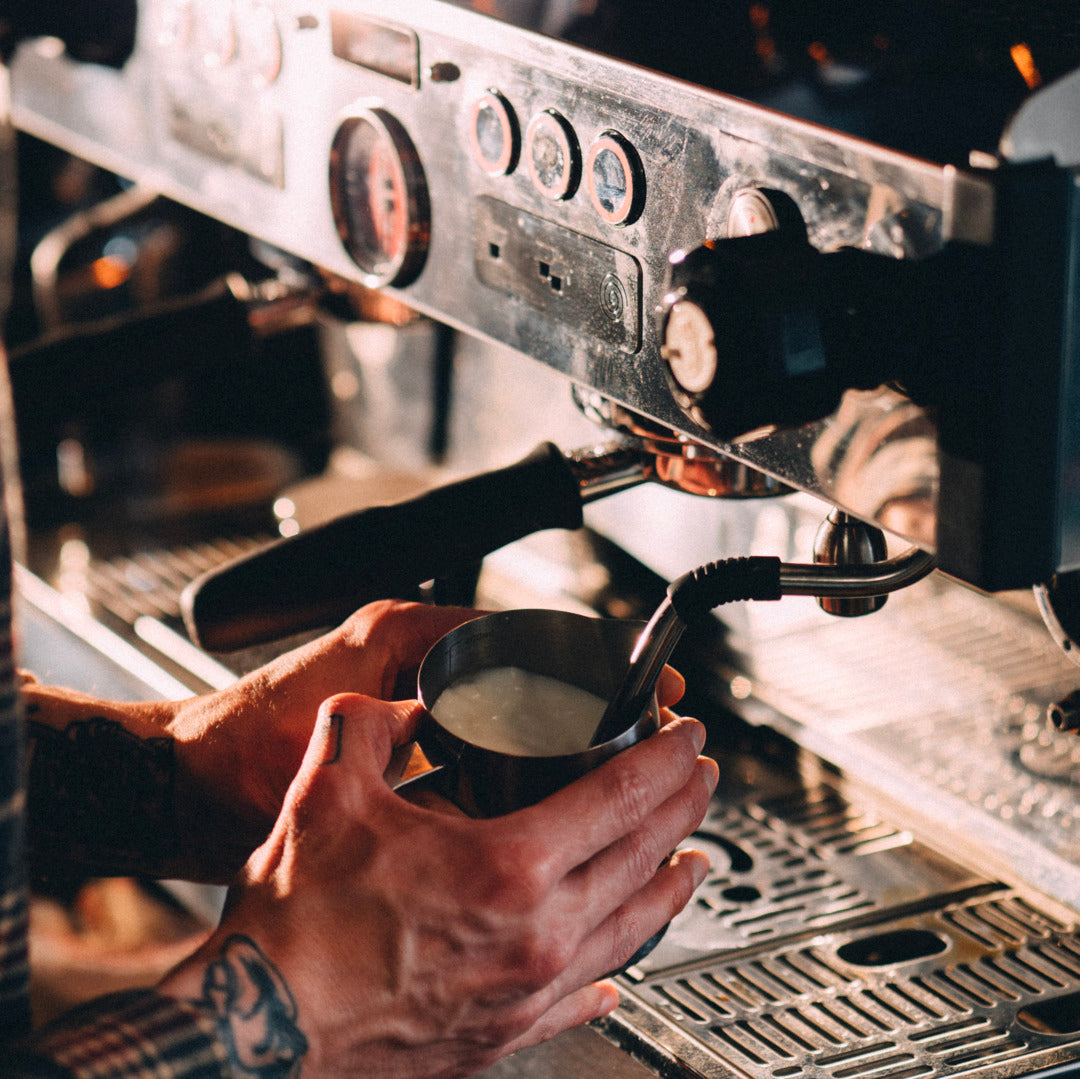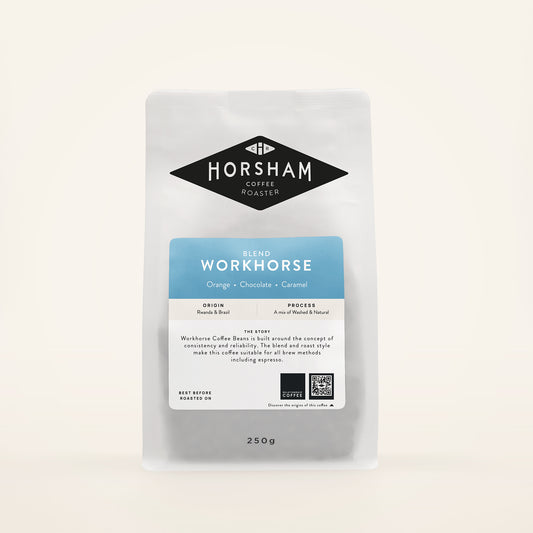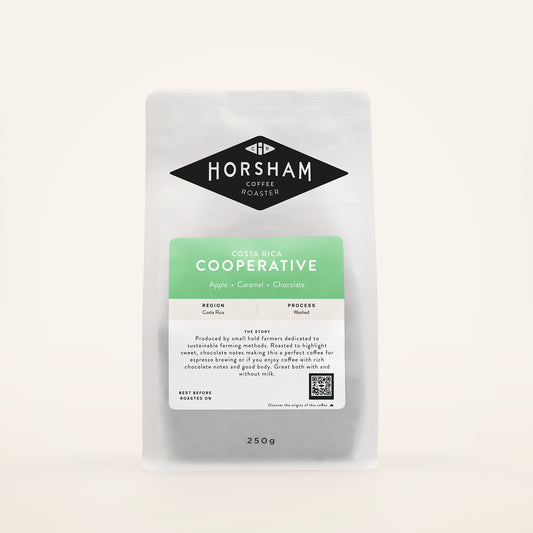If you’re chasing the elusive perfect flat white, you’re not alone. This silky, espresso-forward drink is deceptively simple – but the tiniest tweaks in espresso, milk, or pouring technique can make or break the final result.
At Horsham Coffee Roaster, we’ve dialled in thousands of flat whites across at our roastery café. Here’s our guide to doing it right – at home or behind the bar.

1. Start with the Right Coffee Beans
The flavour of your flat white begins with what’s in the portafilter.
• Choose a medium to light roast – this preserves sweetness, clarity, and balance, even with milk.
• Look for notes of chocolate, nuts, caramel or soft fruit that hold up well.
• We recommend our Workhorse blend – created for drinkers who love espresso with milk. It’s a bright but well-balanced espresso.
✅ Pro tip: Grind just before brewing for the best flavour. Pre-ground coffee loses aroma and complexity within minutes.
2. Dial in Your Espresso Extraction
Consistency matters. Even a perfect milk texture can’t save an under or over-extracted shot.
• Dose: 18–20g of ground coffee
• Yield: 36–40g of espresso (double shot)
• Time: Aim for 28–32 seconds extraction time
• Taste test: Your espresso should taste balanced – sweet and rich, with gentle acidity and no harsh bitterness.
If it’s too sour or too bitter, adjust your grind size, dose or yield.

3. Master the Microfoam
This is where most flat whites go wrong. Microfoam is not froth. You’re aiming for a velvety, glossy texture with barely-there bubbles – like melted ice cream.
How to Steam Milk Properly:
1. Start cold: Use fresh, chilled milk and a cold jug.
2. Stretch the milk: Position the steam wand just under the surface and introduce air for 1–2 seconds. You’ll hear a gentle paper-tearing sound.
3. Spin to texture: Submerge the wand deeper and angle the jug to create a whirlpool. This polishes the milk, breaking down bubbles.
4. Stop at ~60–65°C: This is the sweet spot. Overheating dulls sweetness and ruins texture.
5. Swirl, tap and pour immediately. Don’t let it sit – the texture degrades fast.
What Milk Works Best?
• Whole milk: Best texture and natural sweetness
• Barista versions of alt milks: Non-barista alt milks may not steam as expected – so always use the specific barista versions.
• Avoid long-life, low-protein or sweetened alt milks – they tend to split or froth unevenly
✅ Pro tip: If your milk isn’t glossy enough to reflect light, it’s not ready.

4. Pouring the Flat White: Tips for Control & Art
Once your espresso and microfoam are ready, it’s time to combine them.
The Basics:
• Start high: Begin the pour from a few inches above the cup to help the milk dive under the crema and integrate fully.
• Slow & steady: As the cup fills, lower the jug to just above the surface.
• Finish with control: Use gentle wrist movement to create a heart or rosetta pattern.
Latte Art Tips:
• Always swirl your milk before pouring to re-integrate texture.
• Pouring too fast = washed-out crema
• Pouring too slow = microfoam piles on top
✅ Pro tip: Use a 150–160ml cup. Flat whites should be compact – larger cups dilute flavour and kill the ratio.
Common Flat White Mistakes (and How to Fix Them)
| Mistake | How to Fix It |
|---|---|
| Milk too hot (burnt taste) | Stop steaming at 60–65°C. Use a thermometer or stop when the jug is hot to the touch but not painful. |
| Bubbly or dry foam | Introduce air for just 1–2 seconds, then fully submerge the wand and spin the milk to polish. |
| Espresso tastes sour or bitter | Adjust grind size, dose, or yield. Sour = under-extracted; bitter = over-extracted. |
| Milk splitting or curdling | Use fresh, high-protein milk. Avoid overheating and use barista-grade plant milks when needed. |
| Latte art won’t form | Swirl milk before pouring. Use a pointed-spout jug and keep your pour low and steady near the end. |

5. Gear That Makes a Difference
You don’t need a commercial setup, but these help:
• Espresso machine or a pressure-capable brewer
• Milk jug with a pointed spout for art
• Milk thermometer or practice by touch (jug should be hot, not painful to touch)
• Digital scale to weigh dose & yield
• Burr grinder – avoid blade grinders, which chop instead of crush
Ready To Perfect Your Flat White?
If you’re looking for the right beans to get started, explore our full range of hand-picked coffees which are perfect for espresso. We roast all our coffees with precision and clarity, making them perfect for flat whites and other milk-based drinks.
-
Orange | Chocolate | Sweet Caramel
Workhorse Blend Washed & Pulped Natural
Regular price From £9.00Regular priceUnit price per -
Dark Chocolate | Nuts | Sweet Caramel
Nova Espresso Blend Natural, Washed & Pulped Natural
Regular price From £9.00Regular priceUnit price per -
Cherry | Strawberry | Chocolate
El Zumo Blend Natural
Regular price From £10.75Regular priceUnit price per -
Red Apple | Caramel | Chocolate
Cooperative Costa Rica | Honey
Regular price From £10.25Regular priceUnit price per




